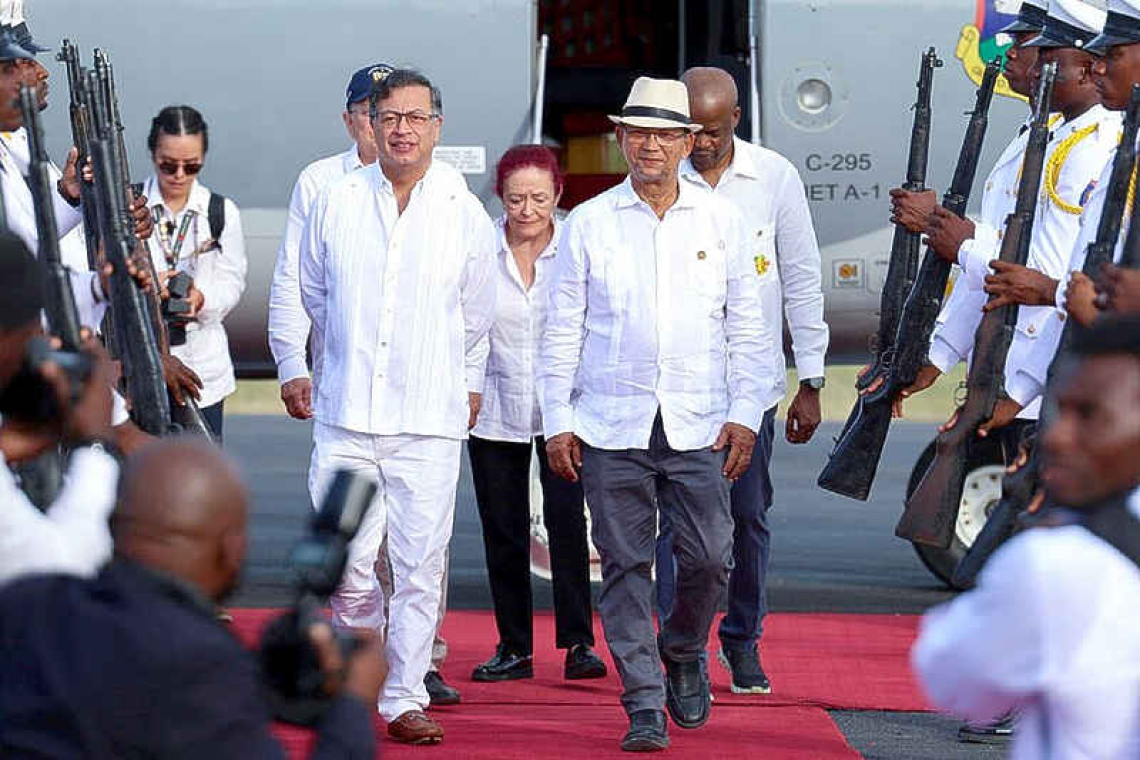Colombian President Gustavo Petro (left) walks accompanied by Leslie Voltaire (right), president of Haiti's Transition Council, upon his arrival for an official visit where they will have a binational council of ministers in Jacmel, Haiti, on January 22. Photo credit Reuters/Marckinson Pierre.
PORT-AU-PRINCE, Haiti--Colombian President Gustavo Petro arrived in Haiti's southeastern city of Jacmel on Wednesday afternoon in a rare visit by a foreign head of state to the Caribbean nation, as Haiti endures an extended conflict with armed gangs.
Colombia has also faced a surge in violence from rebel factions that have brought peace talks to a halt.
Petro arrived in the small coastal city some 90 kilometres (55 miles) from the capital Port-au-Prince on a Colombian military plane several hours after the visit was expected to start, where hundreds of residents turned out to see his arrival.
Petro had a layover in the Dominican Republic, skirting Haiti's embattled capital where several shootings against diplomatic vehicles were reported just this week.
He met with top Haitian government officials including Leslie Voltaire, who holds the transitional presidential council's rotating presidency, in an engagement intended to strengthen bilateral ties.
In an evening ceremony, Voltaire thanked Petro for coming despite the violence in Colombia and said their cooperation would help Haiti in terms of security and the economy, without giving further details of the outcome of the talks.
Petro also spoke out for unity in face of tightening immigration restrictions in the United States.
"They don't want Haitians, they don't want Venezuelans ... they don't want Colombians," he said. "Well, let's leave them alone a while and see how it goes. I believe we will help each other, and those who kick us out will end up alone."
Voltaire has said he wants to foment closer relations with South American nations in a bid to shore up security support as a UN-backed security mission fails to hold off the advances of the country's gangs.
Gangs have, since the mission's approval in late 2023, gained strategic territories resulting in repeated closures of the capital's main port and airport, and worsening food shortages that have resulted in half of the country's 11 million population going hungry.
The number of people internally displaced has more than quintupled to over one million from around 200,000 before the partially deployed mission was approved by the United Nations Security Council.
Also on Wednesday, the UN Security Council met for a briefing on the conflict, where several nations called for stronger measures to restrict the ongoing illegal flow of firearms largely from the United States to Haiti's now broadly allied criminal organisations.
Haitian Foreign Minister Jean-Victor Harvel Jean-Baptiste reiterated calls for the mission, which he said was "gravely underfunded" and lacked key air and maritime capabilities, to be converted into a formal UN peacekeeping mission to make it less dependent on voluntary contributions.
"We're very much looking forward to the other contributions that have been promised for a long time now," he said. "Haiti cannot overcome this crisis alone. That's why we're asking for increased resources to stabilise our security."
Over 200,000 Haitian migrants were deported back to the country last year. ~ Reuters ~







